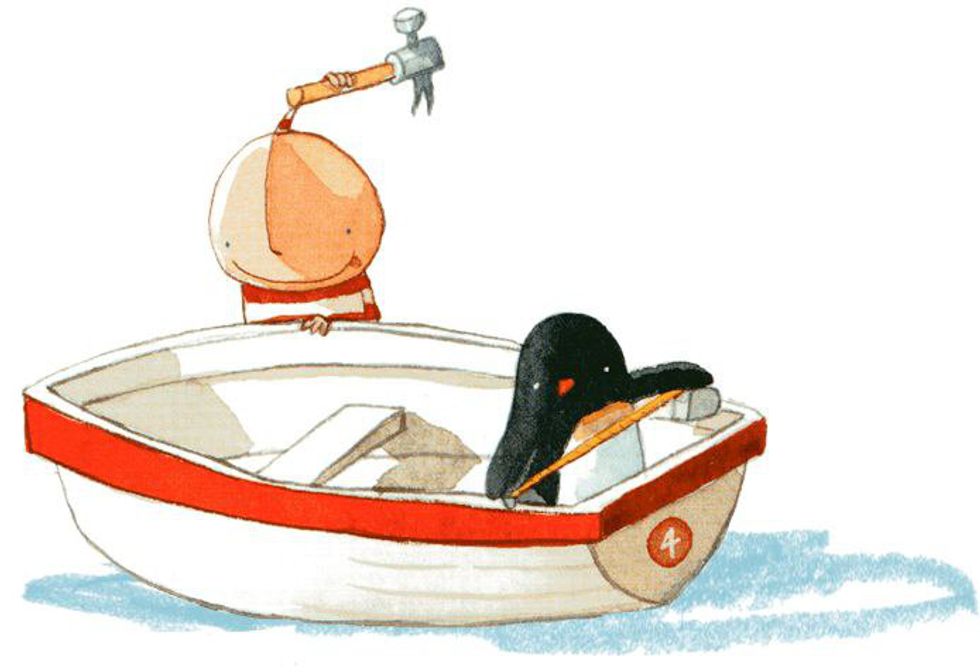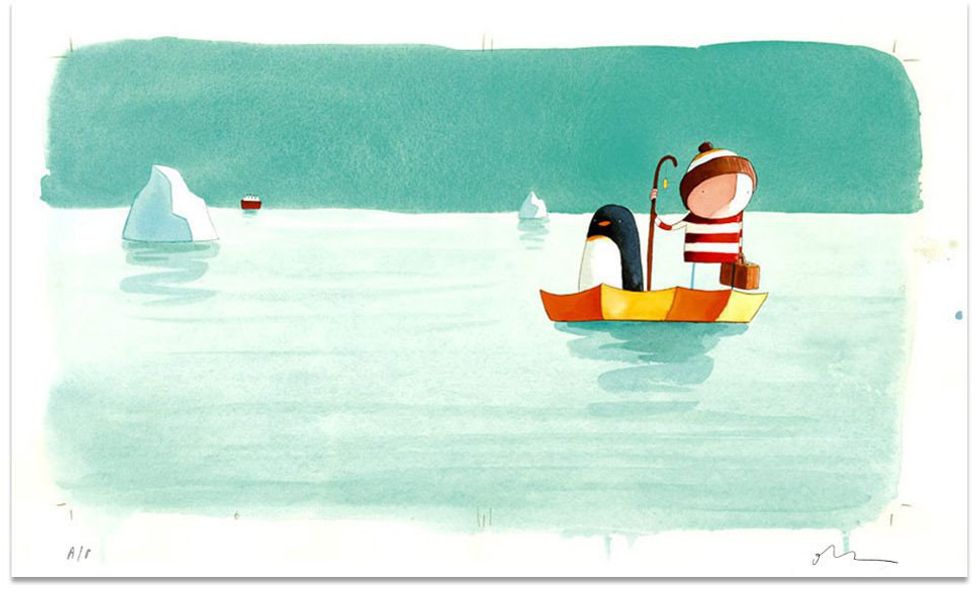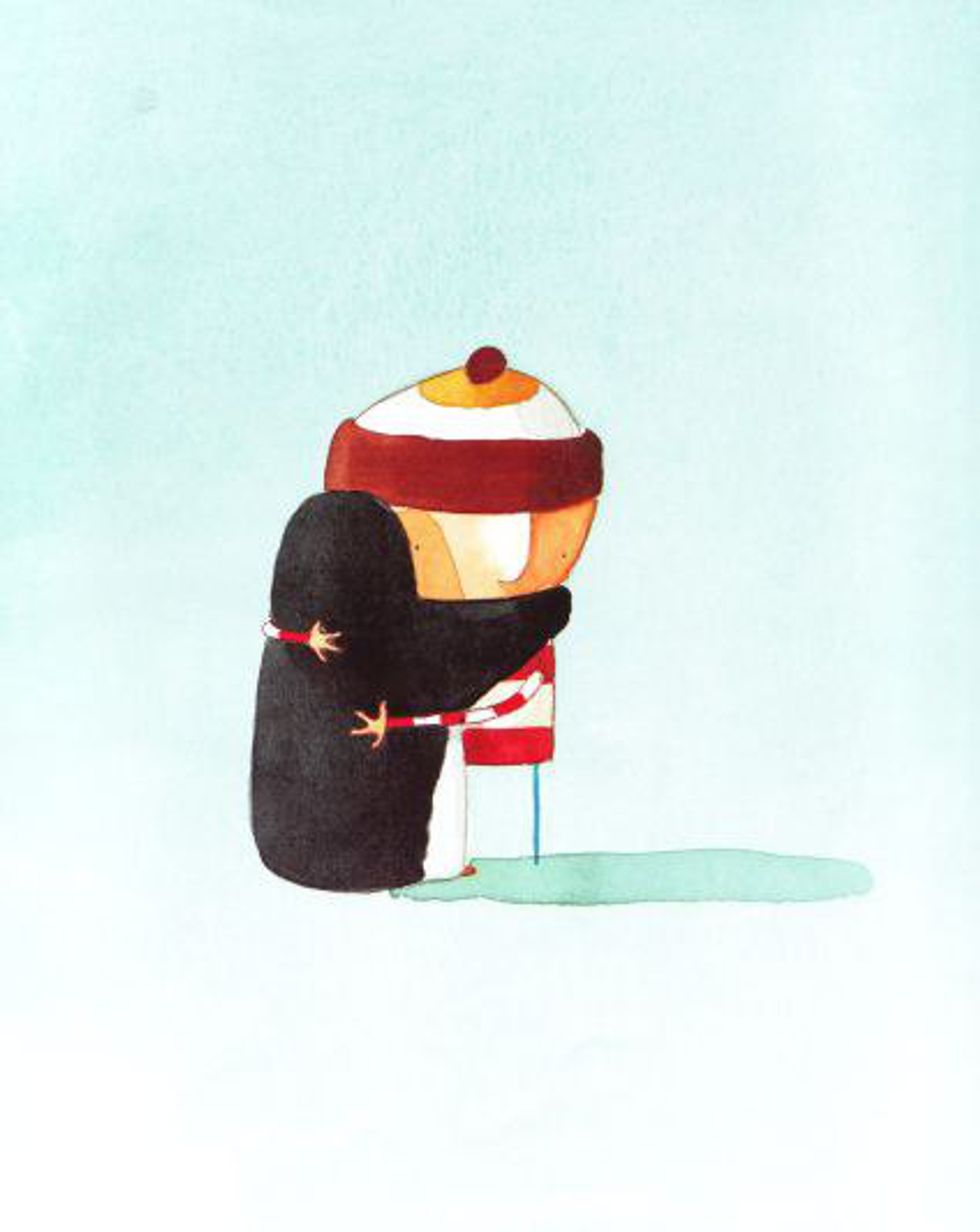Far too often, we as a society write off children’s books as cottony, easy literature suitable for only those with undeveloped craniums. As I have worked in the children’s section of a library for the past three years, I think I can at least attempt to weigh in on the subject. My case in point will be my personal favorite children’s book, Lost and Found by Oliver Jeffers. A picture book with a mere 29 pages, this watercolor masterpiece has taught me more than any so-called ‘age-appropriate’ piece of literature ever could.
A quick summary, in case you haven’t yet been enlightened by this wonderful piece of literature: it is a usual day in a common suburban town for, you guessed it, a rather average young boy, until a little penguin shows up at his door, and begins following him everywhere. After asking every adult and bird he knows where the penguin came from, as you do, the boy, afraid the penguin is hopelessly lost, reads a book and learns where exactly penguins are supposed to be. He packs his bags and sets off with his new friend for the South Pole.
Along the way, he chats with his perpetually silent feathered friend and tells him stories. Once the pair reach the South Pole, the boy says goodbye to the penguin and begins his return home. He notices, though, that the penguin looks sadder than ever as he rows away. Realizing that the penguin was never truly lost, just lonely, the boy rushes back to the Pole, and finds the penguin floating towards him on an umbrella. They go home, together, the boy sharing stories along the way.
Thus far in my life, I have been through over twelve years of schooling. I can tell you the name of the fattest president of the United States (William Howard Taft) and that sine theta equals opposite over hypotenuse. That’s all fine and dandy, of course, but what I’ve found through working with children over the years is that I learn most from them and the books written for them. This particular picture book has taught me three important life lessons, and I feel like these messages should be shared to combat all of the negativity circulating around the world right now.
1. Helping others leads to great things.
One of the most important qualities for one to have is a sense of inconsequential empathy. If someone needs help, and you are in the position where you could help them, not hesitating and going to great lengths to make a difference in this person's (or penguin's) life is crucial to contributing to the cycle of love essential to society. If you make a positive impact on one person, or at least make an attempt at this, you will be taking a huge step towards changing the world. By going out of your way to help another person (or penguin), you open up a world of possibilities: you could make a new friend, sail the seven seas in a rowboat, or at the very least brighten someone's day.
2. Friendship doesn’t see color, size, species, or ability to communicate.
In this book, a penguin and a little boy become best friends. I know some will call this unrealistic, but bonds can be formed across species, planets, and oceans. Lost and Found shows, in a rather obvious fashion, that differences, when it comes to making friends, shouldn't matter. If you have an open mind, and a willingness to experience new things, you won't even have to look for friends. Friends, like in this case, will find you. Giving everyone a chance to become your friend and accepting others for who they are is the only way you will ever grow your group of loved ones.
3. If you find someone awesome, never let them go.
This one, in particular, goes out to all my homies headed to college for the first time this fall. If you're leaving friends behind as you head out on your exciting adventure, people who you care about and have gone through many things with, don't forget about them. True friends can be difficult to find, but when they're there, you can't let go. Make an effort to continue your collective story with these people through college. Send them a cute post (or sappy Odyssey article) when you have a chance. Talk to them on the phone.
Send them care packages and letters. True friends will never let you go, no matter the geographical difference between you. Don't row away. Turn around, miss them, and decrease that distance once again. Even if you have gotten a little lost, no matter what, you can always be found again.










 Energetic dance performance under the spotlight.
Energetic dance performance under the spotlight. Taylor Swift in a purple coat, captivating the crowd on stage.
Taylor Swift in a purple coat, captivating the crowd on stage. Taylor Swift shines on stage in a sparkling outfit and boots.
Taylor Swift shines on stage in a sparkling outfit and boots. Taylor Swift and Phoebe Bridgers sharing a joyful duet on stage.
Taylor Swift and Phoebe Bridgers sharing a joyful duet on stage.












